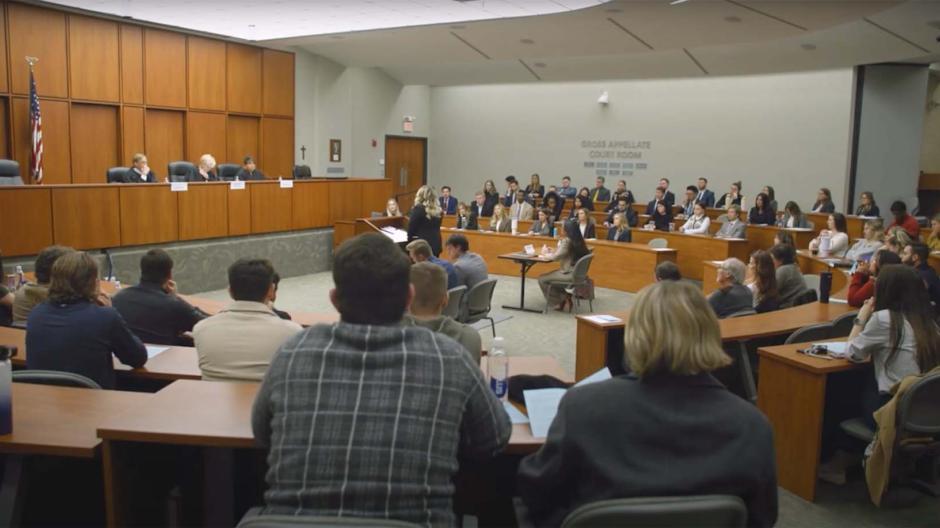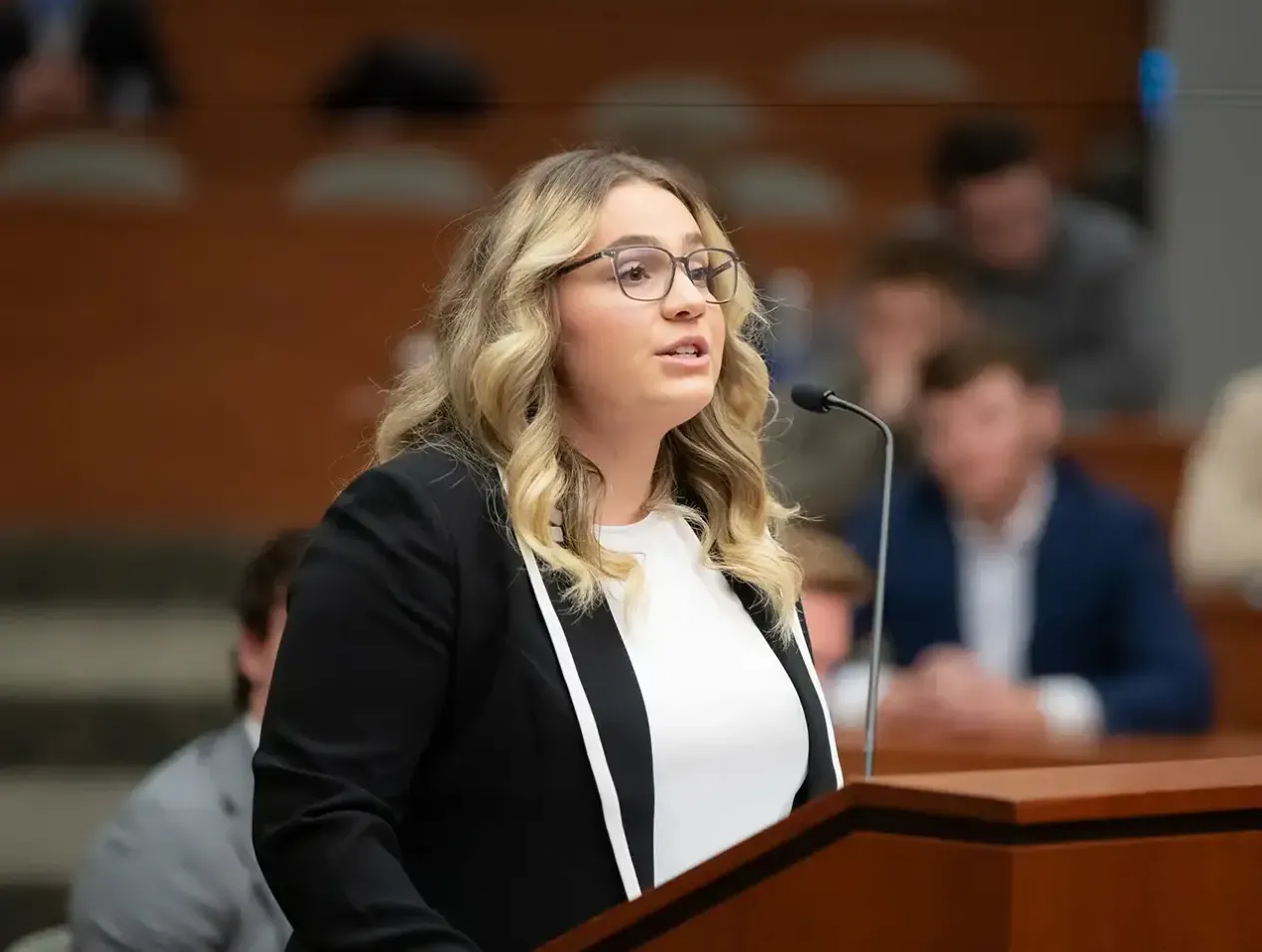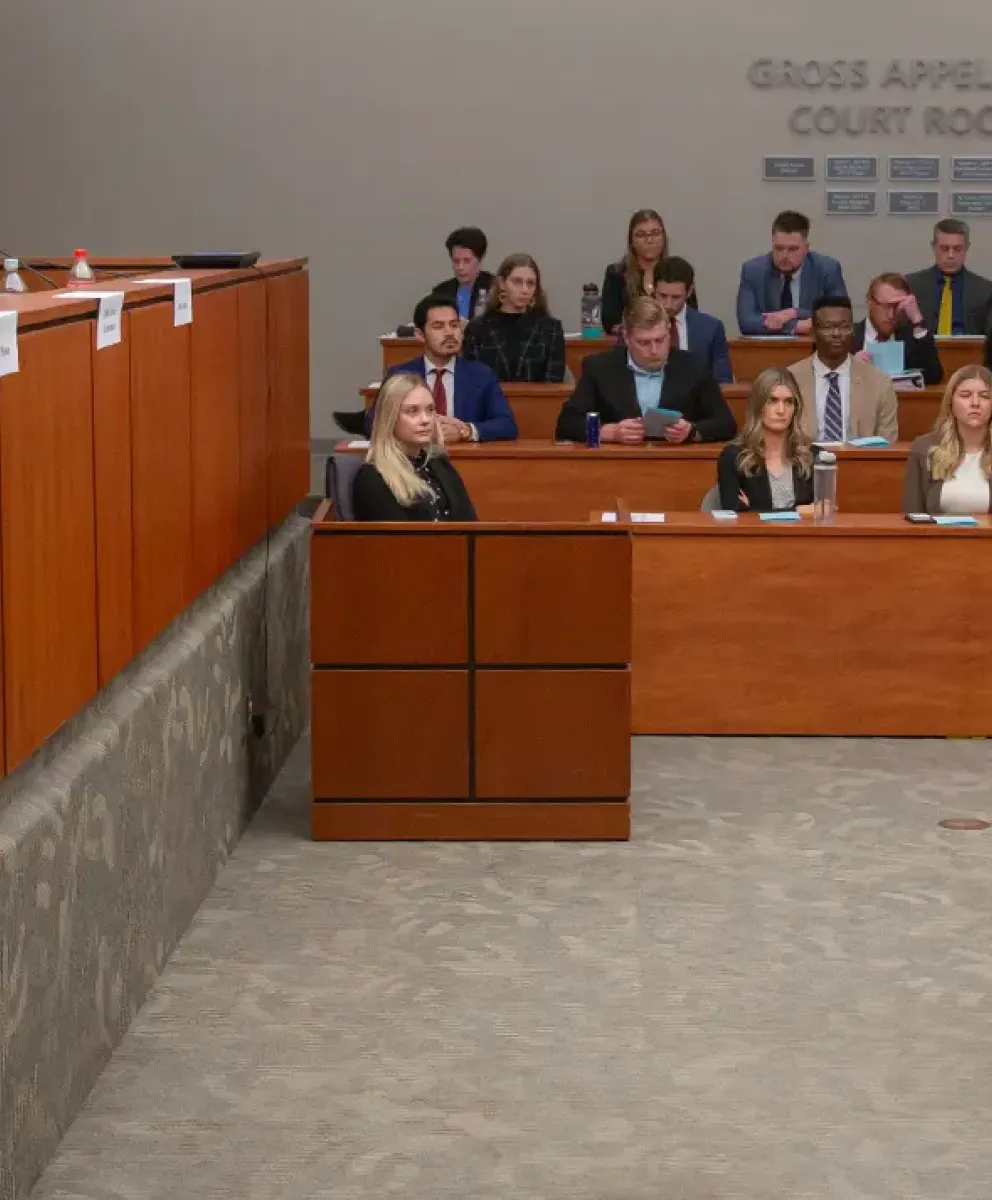
Competition Teams
Practical Experiences That Can Lead to Exceptional Success
The competition teams at the Creighton University School of Law provide a way for you to put theory into practice. When you join one of these competitive teams, you’ll not only sharpen your skills, but also demonstrate to future employers that you have the abilities and experience to be an effective attorney—right out of law school.
Craig W. Dallon
Associate Dean of Academic Affairs
402.280.3093
CraigDallon@creighton.edu
Competition Opportunities
Arbitration Competition
The American Bar Association (ABA) Law Student Division Arbitration Competition simulates a realistic arbitration hearing to promote greater knowledge in arbitration. As a member of this competitive team, you’ll prepare and present an arbitration case, including opening statements, witness examinations, exhibit introductions, evidentiary presentations and summations. You’ll also hone your oral and written advocacy skills while experiencing what it’s like to be a professional, competent and ethical advocate.
- Eligibility: This competition is open to third-year (3L) students enrolled in Arbitration & Trial Law Theory, and tryouts are held in the spring semester of a student’s second year.
- Coaches: Professors R. Collin Mangrum and Larry Teply
- Sponsor: The Werner Institute
Client Counseling Competition
The American Bar Association (ABA) Law Student Client Counseling Competition simulates a law office consultation. In this competition, you’ll be part of a two-person team that’s engaged in an initial consultation with a mock client, but you’ll have limited information about them. Judges will assess your team’s knowledge of the law and your ability to ask the right questions and elicit important information.
- Eligibility: Second- and third-year (2L and 3L) law school students
- Coaches: Professor Larry Teply
- Sponsor: The Werner Institute
Mediation Competition
Creighton University School of Law mediation teams attend the InterNational Alternative Dispute Resolution (INADR) Mediation tournament, which is designed to help law students better understand the mediation process and its importance to law practice. It also encourages students to work with their competition to reach a solution—rather than competing at every turn.
Teams are comprised of three students, who each have the opportunity to participate as an advocate, client or mediator. When participating as a mediator, a student shares the mediating responsibilities with a student from another school; they will not mediate for their own schools.
- Eligibility: Second- and third-year (2L and 3L) law school students
- Coaches: Professors Larry Teply and Rachel Goedken
- Sponsor: The Werner Institute
National Trial Competition
This competition, established by the Texas Young Lawyers Association in 1975, is designed to expose students to trial practice and supplement their education. It is also intended to encourage and strengthen students’ advocacy skills through quality competition and valuable interaction with members of the bench and bar.
- Eligibility: This competition is open to third-year (3L) students enrolled in Advanced Trial Practice, and tryouts are held in the spring semester of a student’s second year.
- Coach: Professor R. Collin Mangrum
Negotiation Competition
Being proficient in negotiation is an important skillset for all lawyers, no matter what area of practice they pursue. Quality client representation requires the ability to negotiate contracts, settlements and other agreements.
The American Bar Association (ABA) Law Student Division Negotiation Competition will help students build these essential skills by providing a forum to negotiate under time constraints—and potentially in an unfamiliar area of law. In simulated negotiations, students will be presented with both a common set of facts known to all participants, as well as confidential information known only to students representing a particular side. These simulations deal with the same general topic, yet the negotiation scenario varies with each round and level of competition.
- Eligibility: Second- and third-year (2L and 3L) law school students
- Coaches: Professors Larry Teply and David Weber
- Sponsor: The Werner Institute
Trial Advocacy Competition
The American Association for Justice Student Trial Advocacy Competition is an annual nationwide mock trial competition that gives students the opportunity to develop and practice their trial advocacy skills before distinguished members of the bar and bench.
- Eligibility: This competition is open to third-year (3L) students enrolled in Advanced Trial Practice, and tryouts are held in the fall semester.
- Coach: Professor R. Collin Mangrum
Additional Trial Competitions
In addition to the competitions listed above, the School of Law is invited to attend and compete in a number of trial competitions each year. This includes the Buffalo-Niagara Mock Trial Competition and the National Criminal Justice Trial Advocacy Competition. These competitions are frequently coached by Professor Ken Melilli.
Moot Court and Related Competitions
Moot Court participation with the School of Law’s writing professors is mandatory during the first semester of your second year in law school. It involves appellate cases as opposed to those at the trial level. Participating in Moot Court requires researching, writing appellate briefs, and presenting oral arguments to judges. You must have a profound understanding of the facts of the case, your arguments and your opponents’ arguments to be able to answer questions judges will ask you throughout your presentation. In fact, Moot Court will help you become more comfortable formulating and expressing arguments before judges. These are essential skills for any attorney—demonstrating to future employers you can put in the hours to perfect legal analytics, research and writing skills.
- Jessup International Moot Court Competition: This is the world’s largest moot court competition, with participants from roughly 700 law schools in 100 countries and jurisdictions. The competition simulates a fictional dispute between countries before the International Court of Justice, the judicial arm of the United Nations. Teams prepare oral and written pleadings arguing both the applicant and respondent positions of the case. This team is coached by Professor Patrick Borchers, and 2L and 3L students may try out for the team.
- National Moot Court Tournament: This competition is sponsored by the New York City Bar Association and is coached by Professors Daniel Real and Kristine Cote. It is open to third year (3L) students who meet the following prerequisites: LRWIII and a “B” grade in brief and quarterfinal level in LRWIII Moot Court (or permission from a coach).
- Pace Environmental Moot Court Competition: This competition is held at Pace University School of Law, Westchester, NY and is designed to test skills in appellate brief writing and oral advocacy on issues drawn from real environmental cases. Each argument features three opposing sides (the government, a public interest group and a regulated industry) to reflect the complexities of environmental litigation. The competition is open to 2L and 3L students.
- Saul Lefkowitz Trademark Moot Court Competition: This is sponsored by the International Trademark Association and coached by Professor Craig Dallon. Second- and third-years (2L and 3L) students may try out for this competition team during the fall semester.
Moot Court at Creighton

Accreditation, Bylaws, Disclosures, Policies and Reports
School of Law Bylaws
We operate in accordance with the Creighton University School of Law’s faculty bylaws and American Bar Association (ABA) accreditation standards.
Accreditation Information
Creighton University School of Law is approved by the Council of the Section of Legal Education and Admissions to the Bar of the American Bar Association, 321 North Clark Street, Chicago, IL 60654, 312.988.6738.
According to the ABA, “Law schools that are ABA-approved provide a legal education that meets a minimum set of standards promulgated by the Council and Accreditation Committee of the Section of Legal Education and Admissions to the Bar. Every U.S. jurisdiction has determined that graduates of ABA-approved law schools are eligible to sit for the bar exam in their respective jurisdiction.”






